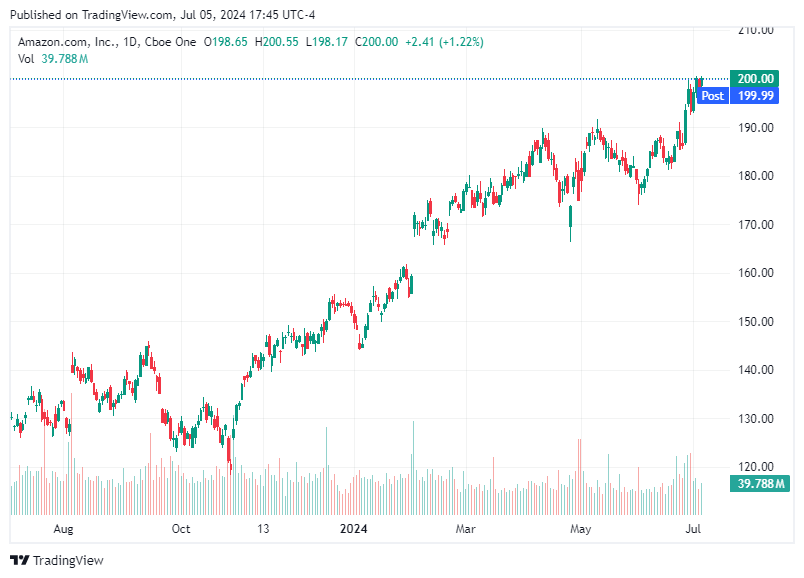European Commission Demands DSA Compliance Details From Amazon
Amazon Under EU Scrutiny for Recommender Algorithms and Ads Transparency.

Disclaimer: The following article is a detailed exploration of the current EU scrutiny of Amazon regarding its recommender algorithms and ads transparency. The information provided is based on recent developments and is intended for informational purposes only. It does not constitute legal advice or commercial promotion.
Real-time information is available daily at https://stockregion.net
The European Commission has called upon Amazon to provide comprehensive details about its compliance with the Digital Services Act (DSA) regulations, focusing particularly on recommender systems and advertising transparency. As part of this inquiry, Amazon is required to respond by July 26, 2024, or face potential sanctions. This request marks another significant step in the EU's ongoing effort to ensure that large online platforms adhere to stringent governance standards aimed at enhancing algorithmic transparency, accountability, and mitigating risks associated with illegal goods on their platforms.
In recent years, the European Union has intensified its scrutiny of major online marketplaces to ensure they comply with evolving digital regulations. The latest request for information (RFI) sent to Amazon is part of a series of steps taken under the DSA, a comprehensive legislative framework designed to regulate digital services and platforms operating within the EU. This legislation imposes several obligations on platforms, including content moderation, transparency measures, and the implementation of mechanisms to tackle the risks associated with illegal goods.
Amazon, as one of the world's largest e-commerce platforms, has been under the EU's microscope for some time. Previous RFIs sent to Amazon have focused predominantly on risk assessments related to the dissemination of illegal products and the protection of fundamental rights concerning its recommender systems. In addition to these inquiries, another RFI in January sought more details on how Amazon provides data access to researchers, highlighting the EU's commitment to ensuring comprehensive oversight over large online platforms.
The DSA aims to create a safer digital space where the fundamental rights of users are protected and to establish a level playing field for businesses across the EU. Key requirements under the DSA include:
Content Moderation: Platforms must have robust mechanisms for moderating content to prevent the spread of illegal or harmful material.
Transparency Obligations: This involves clear communication about how recommender algorithms work and the parameters they use, alongside maintaining an ad repository that provides transparency about advertisements shown to users.
Risk Assessment and Mitigation: Platforms must conduct regular risk assessments to identify systemic risks and take proactive measures to mitigate these risks. This includes providing detailed reports on their compliance with these measures.
For larger marketplaces like Amazon, which have been designated as very large online platforms (VLOPs), there are additional layers of accountability. This designation, which Amazon received in April 2023, means it must adhere to stricter rules and more rigorous oversight to ensure compliance with the DSA.
Focus Areas of the Latest RFI
The current RFI from the European Commission focuses on critical areas:
Transparency of Recommender Systems: The EU is seeking detailed information about the algorithms Amazon uses to recommend products to its users. The transparency of these systems is crucial because they significantly influence consumer behavior and purchasing decisions. The Commission wants to understand how these algorithms function, the parameters they consider, and the measures Amazon has put in place to ensure they do not promote illegal or harmful goods.
Advertising Transparency: Another key focus of the RFI is Amazon's compliance with transparency requirements regarding its advertising practices. This includes maintaining an ad repository that provides detailed information about the ads displayed on its platform. By doing so, the Commission aims to ensure that users are aware of who is behind the ads they see and can track the sources of advertising content.
Risk Assessment Reports: The Commission has also requested more information on Amazon's risk assessment processes. Under the DSA, VLOPs must regularly assess systemic risks and take proactive steps to address them. This includes documenting their compliance processes and demonstrating how they mitigate potential issues related to illegal goods, misinformation, and other harmful content.
The stakes are high for Amazon as non-compliance with the DSA can result in substantial financial penalties. The DSA stipulates that breaches of its provisions can lead to fines of up to 6% of a company's global annual turnover. For Amazon, whose full-year revenue for 2023 was $574.8 billion, potential penalties could reach into the billions of dollars. While the outcome of the latest RFI remains uncertain, the EU's actions underscore its stringent approach towards regulating digital platforms. The Commission's efforts reflect a broader trend of increasing regulatory oversight aimed at holding tech giants accountable and ensuring they operate in a manner that safeguards user rights and promotes transparency.
The Future
The scrutiny of Amazon is part of a larger movement within the EU to regulate the digital economy more effectively. The DSA, along with the Digital Markets Act (DMA), represents a comprehensive approach to addressing the complexities of the digital landscape. These regulations aim to curb the power of major tech companies, ensuring they do not engage in anti-competitive practices and that their operations are transparent and fair. The EU's regulatory framework is also influencing other jurisdictions, with countries around the world looking to implement similar measures to govern digital platforms. This trend indicates a growing recognition of the need for robust oversight mechanisms to manage the vast influence and reach of digital service providers.
As the EU continues to enforce its digital regulations, companies like Amazon will need to navigate an increasingly complex regulatory environment. Compliance with these laws not only helps avoid hefty fines but also builds trust with consumers and stakeholders by demonstrating a commitment to transparency and accountability.
The European Commission's latest request for information from Amazon highlights the importance of transparency and accountability in the digital economy. As the deadline for Amazon's response approaches, the e-commerce giant faces significant pressure to demonstrate its compliance with the DSA's stringent requirements. The outcome of this inquiry will have far-reaching implications, not only for Amazon but for the broader regulatory landscape governing digital platforms.
Disclaimer: The information provided in this article is intended for informational purposes only and does not constitute legal advice or commercial promotion. The developments discussed herein are based on recent events and may evolve as new information becomes available. Readers are encouraged to stay informed about ongoing regulatory changes impacting the digital economy.
Real-time information is available daily at https://stockregion.net


